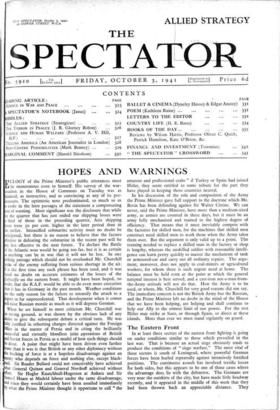HOPES AND WARNINGS
EULOGY of the Prime Minister's public utterances must be monotonous even to himself. His survey of the war- situation in the House of Commons on Tuesday was as balanced, as instructive, and as convincing as any of its pre- decessors. The optimistic note predominated, so much so as to evoke in the later passages of the statement a compensating note of warning. Most significant was the disclosure that while or the quarter that has just ended our shipping losses were third of those in -the preceding quarter, Axis shipping losses were 5o per cent. higher. in the later period than in the earlier. Intensified submarine activity must no doubt be anticipated, but there is no reason to believe that the factors effective in defeating the submarine in the recent past will be any less effective in the near future. To declare the Battle of the Atlantic won would be going too far, but it is as certain as anything can be in war that it will not be lost. In one stnking passage which should not be overlooked Mr. Churchill spoke of the enemy suffering from serious shortage in the air. It is the first time any such phrase has been used, and it was based no doubt on accurate estimates of the losses of the Luftwaffe on the eastern front. It might have been hoped, no doubt, that the R.A.F2would be able to do even more execution than it has in Gerinany in the past month. Weather conditions are the only reason for the failure to intensify the attack to a degree so far unprecedented. That development when it comes will raise Russian morale as much as it will depress German.
When he set himself to meet criticism Mr. Churchill was on strong, ground, as was shown by the obvious lack of any desire to give the subsequent debate a critical turn. He was hilly justified in rebutting charges directed against the Foreign Office in the matter of Persia and in citing the brilliantly successful and virtually bloodless joint pperations of British and Soviet forces in Persia as a model of how such things should be done. A point that might have been driven even farther home than it was is that British or any other diploma-- cy without the backing of force is at a hopeless disadvantage against an rnemy who • depends on force and nothing else, except black- Plait Sir Reader Bullard could not conceivably have achieved that General Quinan and General Novikoff achieved without Ott. Sir Hughe Knatchbull-Hugessen at Ankara and Sir Samuel Hoare at Madrid labour under the same disadvantage, and since -they would certainly have been assailed immediately by what the Prime Minister thought it opportune to call " the amateur and professional crabs " if Turkey or Spain had joined Hitler, they seem entitled to some tribute for the part they have played in keeping those countries neutral.
In his discussion of the role and composition of the Army the Prime Minister gave full support to the doctrine which Mr. Bevin has been defending against Sir Walter Citrine. We can never, said the Prime Minister, have more than a medium-sized army, as armies are counted in these days, but it must be an army fully mechanised and trained to the highest degree of efficiency. That means that it must inevitably compete with the factories for skilled men, for the machines that skilled men construct need skilled men to work them when the Army takes them over. But the argument is only valid up to a point. The training needed to replace a skilled man in the factory or shop is lengthy, whereas the unskilled soldier with reasonable intelli- gence can learn pretty quickly to master the mechanism of tank or armoured-car and carry out all ordinary repairs. The argu- ment, moreover, does not apply to coal-miners or agricultural workers, for whom there is such urgent need at home. The balance must be held even at the point at which the general national interest is best served, and a cast-iron not-a-man-from- the-Army attitude will not do that. How the Army is to be used, or where, Mr. Churchill for very good reasons did not say. The immediate concern is not the British Army but the Russian, and the Prime Minister left no doubt in the mind of the House that we have been helping, are helping and shall continue to help our Ally to the utmost limit of our power. For the rest Hitler may strike at Suez, or through Spain, or direct at these islands. More than ever we must stand vigilantly on guard.


























